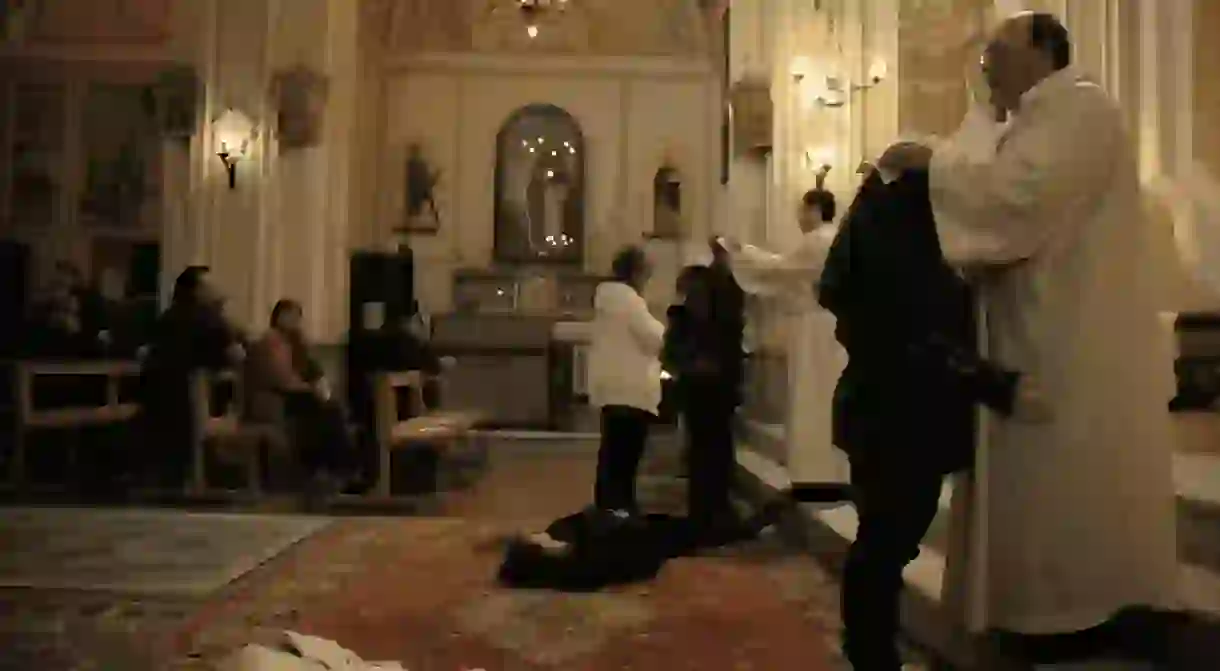What's Behind the Disturbing Rise in Exorcisms Around the World?

It may seem hard to believe, but exorcisms are still a part of everyday life in some parts of the world. Liberami (taken from the latin Libera Nos which in turn translates asDeliver Us), is a chilling documentary that explores how the phenomenon is increasing in popularity in Sicily… and around the world.
Director Federica Di Giacomo takes an already fascinating subject – one that has formed the basis of numerous horror films throughout the years – and explores the real-life ramifications of the practice of exorcisms. Di Giacomo follows two Sicilian priests whose daily routine includes speaking to troubled individuals and ridding them of the demons they believe possess them.
We spoke to the filmmaker about her experience of making the film and if there is something sinister (but not supernatural) about the growing popularity of exorcisms.
Culture Trip: How easy was it to get people to participate in your documentary?
Federica Di Giacomo: We spent a long time doing research and we stayed in mass for a long time without the camera and we met some priests to talk about their work because their work is common, everyday life for them. As we began to talk about the documentary, and they understood it was a serious film, that was when they began to collaborate with us. It was the same with the people shown in the documentary, as they believed they could help with others in the same situation by taking part.
CT: When did you know that this would make a great subject for a film?
FDG: When I realised that it was an incredibly interesting subject, in terms of the humanity of the priests and the people going to mass. There were a lot of aspects, not only drama but irony and doubts and many other things that makes the questions the documentary asks more complex than simply being about the paranormal.
CT: Were you ever frightened by anything while filming?
FDG: No, I was afraid only the first time I saw an exorcism, then it became an experience that was very intense but not frightening, more like common everyday life, like it is for them.
You might also like: Scariest Zombie Films From Around the World, Ranked

CT: What was the most terrifying thing you experienced while making the movie? Any other experiences you want to share with us?
FDG: Some of the priests can be terrifying, but most of the experiences weren’t as terrifying as they may appear.
CT: A lot of the religious people involved seem to be used to the idea of exorcisms and dealing with people who claim to be possessed. Is it a big part of what they do every day?
FDG: Yes, of course, it was certainly a part of their everyday life, in the sense that we used to think of possession as it is in movies or in film but we don’t think about it as a mental state, which you can enter for two hours before then going out and living your daily life. It becomes a weekly appointment, like going to the gym or therapist, which was the focus of the film; asking, ‘How can something so violent and strong become everyday life?’.
CT: We hear throughout the film that cases requiring exorcisms are on the rise…what do you think is the reason for this?
FDG: I can’t define it, but I think there is a failure in our welfare system, of how to help people with a certain kind of disease. Theoretically it is a problem which is not only psychological but spiritual. We live in a materialistic society but sometimes the irrational choice becomes an answer, going to satanic mass or something similar. We cannot only speak about a psychic disease, it requires more categories to fully understand the problem.
You might also like: Scariest Horror Films from Around the World, Ranked
CT: How much research did you do on the subject beforehand?
FDG: The research was continuous – it was more than three years of work – but in the documentary, there isn’t a thesis, it’s the observation of this reality which is constantly changing.
CT: Is this unique to Sicily, or to Italy? Or are exorcisms on the rise around the world?
FDG: It’s a worldwide phenomenon; all of Europe and even in the US, Latin America and the Philippines, it’s a post-modern problem. It’s not about gender, economic factors, or age, it’s all-encompassing. Old people and young people of all different cultures that may have the option of a therapist but are choosing to seek out exorcism.

CT: Did you change your mind about anything during the course of filming?
FDG: It’s such a complex matter than we were in a continuous discussion about all the various aspects, but that’s the good thing about it, that the discussion is never-ending, so every day we discover more and more that’s interesting and philosophical about the reality and the disease which is inspiring to work on.
Deliver Us (Liberami) is in cinemas 27th October and on DVD 30th October













